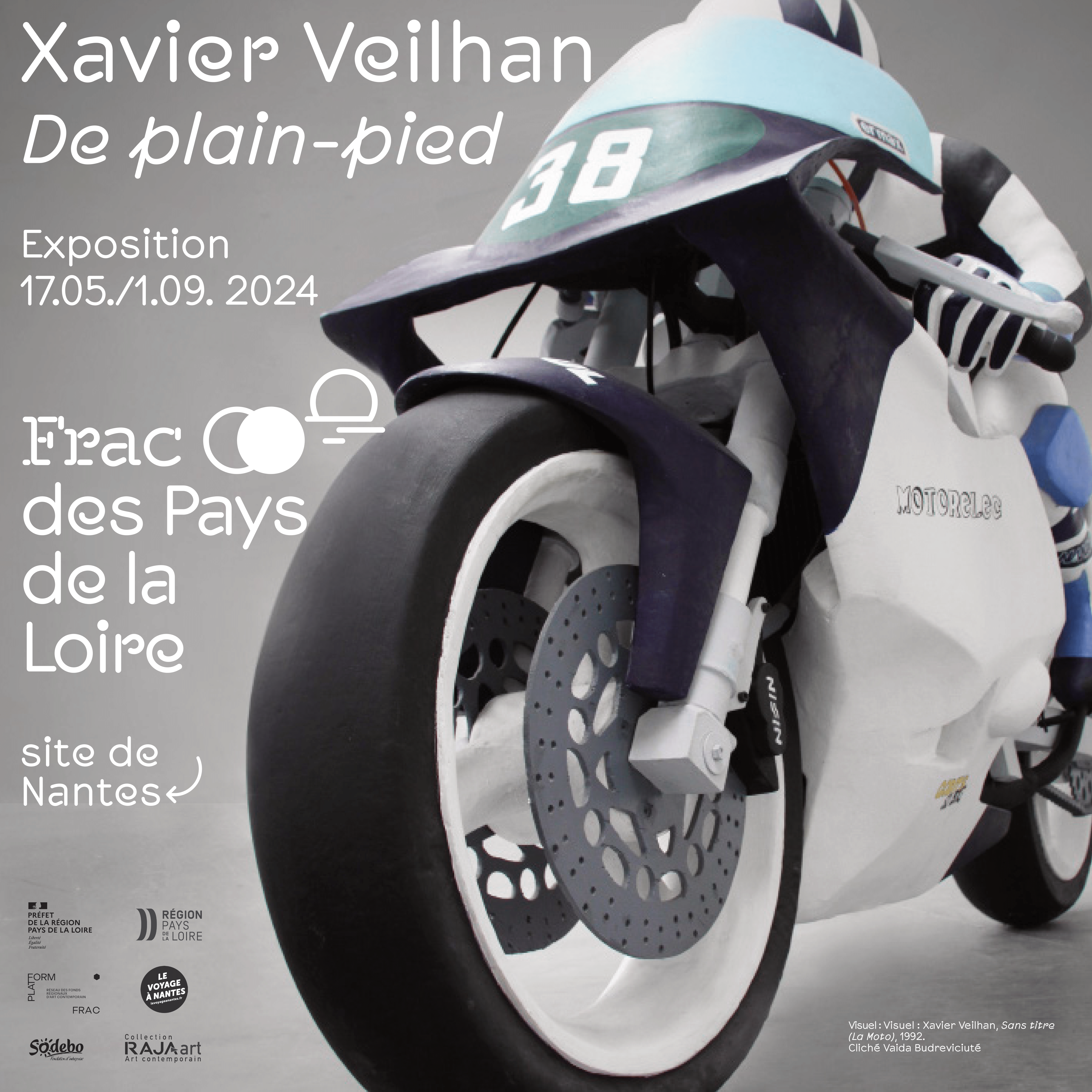Christophe Bruno – Hacking Google / Against Algorithmic Governmentality
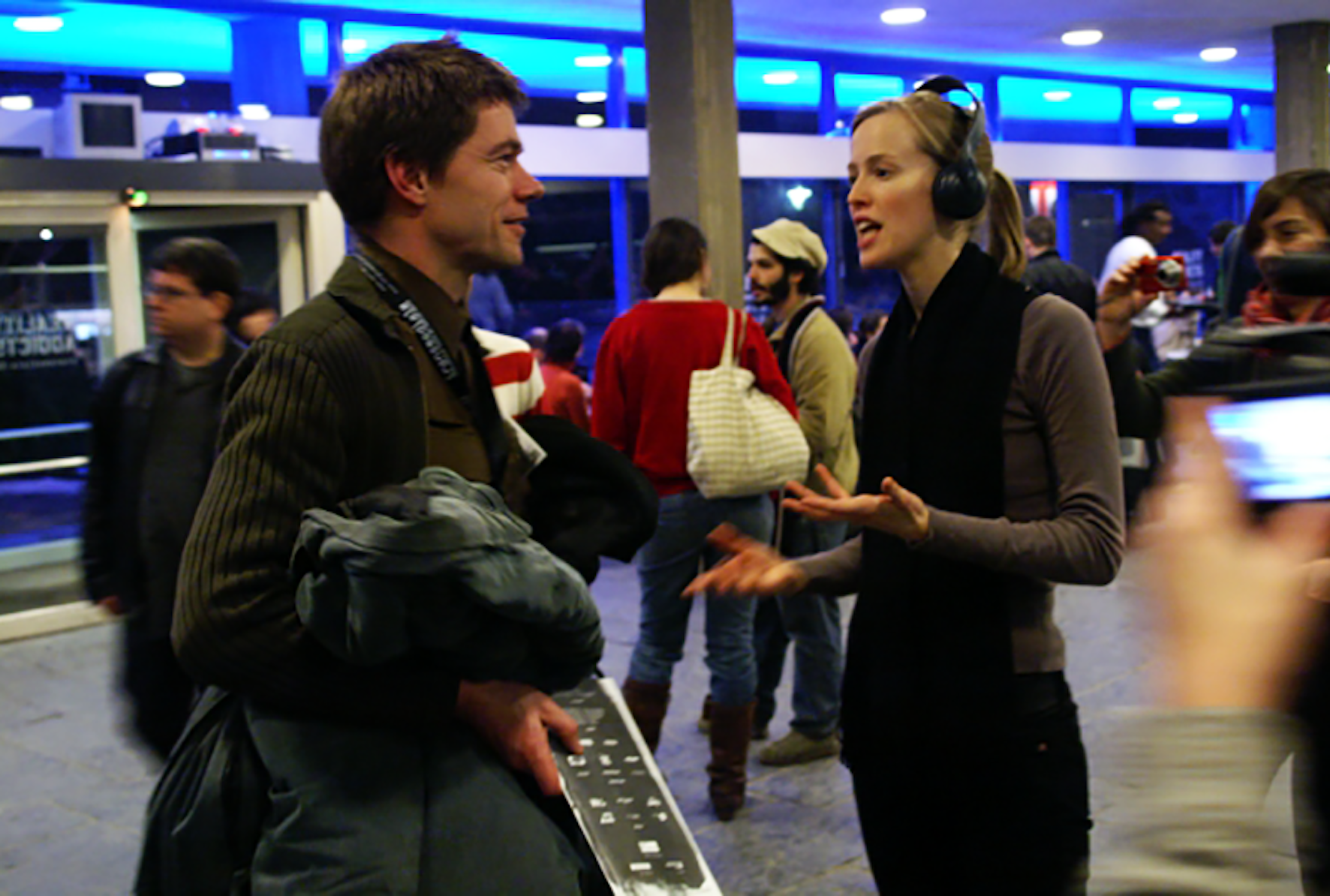
Google is a champion of cultural democracy, but without culture and without democracy, since it is a master neither of culture (information is not paideia) nor of politics (the democracy of clicks is not a democracy).1
This article is a digest that is partly reconstructed and taken from Fourmentraux Jean-Paul, antiDATA. La désobéissance numérique. Art et Hacktivisme technocritique, Dijon, Les Presses du réel, 2020.
With a PhD in theoretical physics, and a conversion to the arts in the 2000s, the French artist Christophe Bruno has conceived of his work as a real Trojan horse aimed against the hegemony of Google. Since 2001, he has been focusing on critically and prospectively subverting, in a systematic and often comical manner, the functionalities and uses of the infamous and now “unavoidable” search engine. As he embodies the revival of the figure of the “hacker” artist, his works draw us into a joyful and cynical parody of our linguistic and visual economies, generated through digital platforms.
Epiphanies and Adwords Happenings
In 2001, the artist created his first Epiphanies,1 which are (post) Net Art “pieces” that extend James Joyce’s works to the Web. At the beginning of the 20th century, the writer used to roam the streets of Dublin, writing down in his notebook, along the way, snippets of conversation exchanged with the different people who may have crossed his path, –conversations which he believed possessed poetic value to be acknowledged. In the 21st century, Christophe Bruno transposes this sensitive and poetic drift into the world of Internet and Google. Starting with a keyword entered by a Web user in the browser bar of his search engine, the generator of Epiphanies parasites and interferes with Google’s algorithm in order to collect bits of sentences from the Internet that are then rearranged like little random poems.2
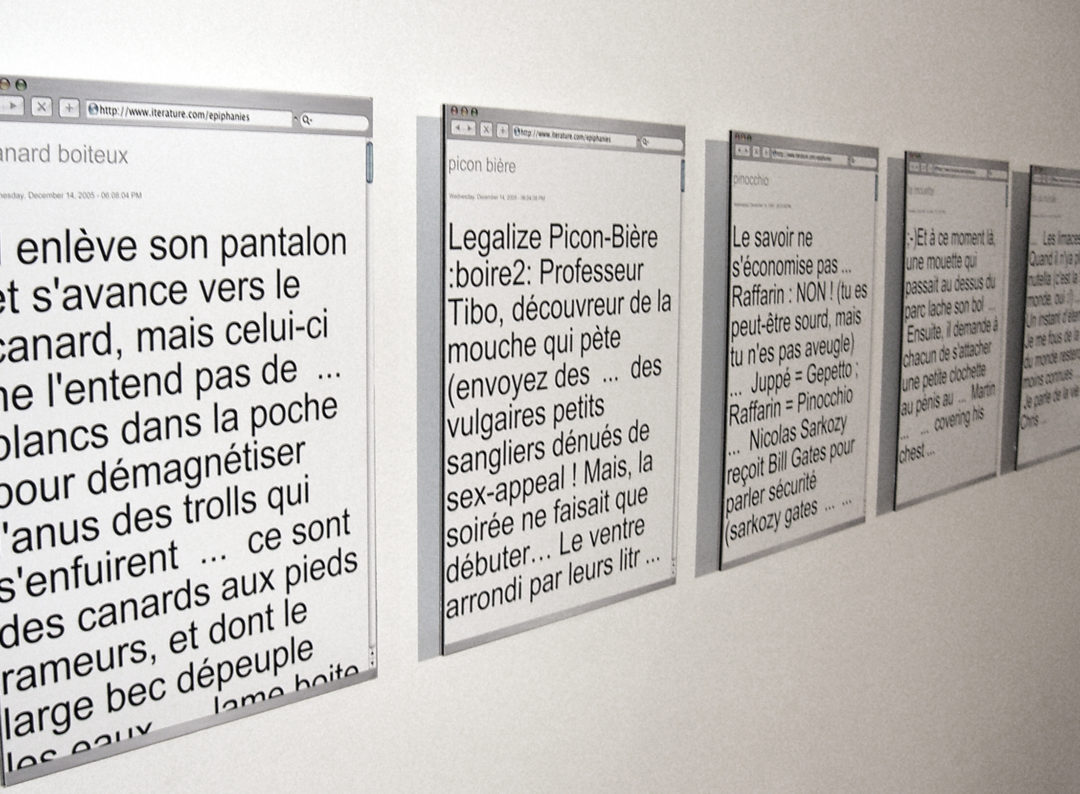
The mindset [of this work] is not to create a text generator […] but really it is rather about the attitude of positioning oneself as a parasite to a global structure which is emerging, –Google–, and which holds in its database all of mankind’s words […]; a sort of readymade that my programme fishes out and subverts.3
Willing to radicalise this approach, the artist created in 2002 a 24-hour performance, Google Adwords Happening,4 which subverted and parodied the logic of AdWords by which Google increases its advertising income, as it associates commercial links to the results of its search engine. The first AdWord rented by Christophe Bruno was the word “symptom”. When a Web user connected to Google entered this word in the browser bar of his search engine, he would first come across the following enigmatic poem: “Words aren’t free anymore/bicornuate-bicervical uterus one-eyed hemi-vagina”. Hacking into the system by which Google entered the stock market and went public, Christophe Bruno created new strange and poetic Epiphanies, which humorously parodied the strictly utilitarian and commercial logic of the language established by Google; namely, the keywords used for advertisements (AdWords), leading to the production of successful, fortuitous connections (hits, or “good hits”, like the “hit parade”).
But the project was quickly hampered by Google, due to its commercial non-profitability, under the pretext that the words listed by Bruno lacked in price and value. Strictly speaking, what happened was not a matter of moral or even ethical censorship. What this project revealed was not really Google’s lack of interest in the poetic value of the artist’s approach, but rather the economic sanctions following the presumed failure of the said approach. As for Christophe Bruno, he sees in this situation the symptom of a new, semantic capitalism, established by the Google firm, which appropriates and transforms language into merchandise.
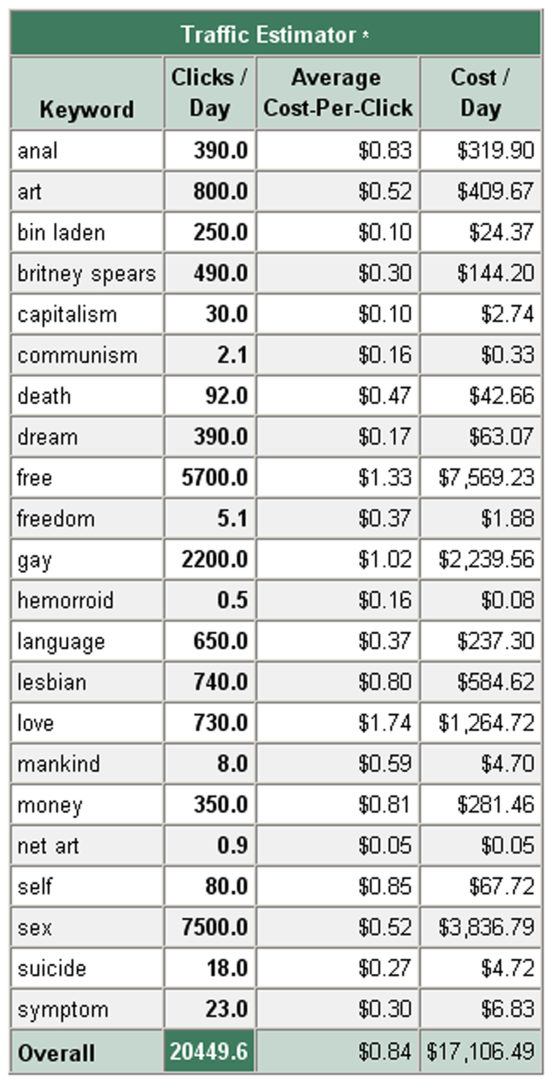
As a renter of the AdWords service, Christophe Bruno had access to statistics regarding the performance and efficiency of his AdWords. For “symptom” for example, he obtained only 16 hits from Internet users for a total of 5,517 views of the poem. The rental of this word therefore had the low efficiency rate of 0.3%. Since the price of “symptom” was $0.05, the artist was charged $0.80. A rather poor score if one happens to compare it to the price of other words, whose Google value clearly points out to the corrupting mechanisms of AdWords: “sex” with $3,800 –pretty expected–, “art” with a derisory $410, “God” with $10 –speaking for itself–, while “free” hits an astonishing $5,700. A real statistical irony, which makes the word “free”, translated in French as both “free in regards to liberty” and “free of charge”, the most expensive word on the list and whose use was also the costliest…
A mindful and a great lover of words and language, the philosopher and philologist Barbara Cassin has carefully highlighted the relationship by which quality is nothing more than an emerging trait of quantity, under the Google regime. This idea thus states a departure from Google’s supposedly democratic virtues, embodied by the famous and no less impenetrable algorithm PageRank.
Importance within the domain of opinion is the measure of the importance of the opinion. In ancient Greek, the doxa is squared, and in Marxist terms, you only lend to the rich (capital creates capital). Originality, atypicality, genius, or the singularity and untimeliness of the truth do not form part of the system unless they are made commonplace: there is no otherness to doxa.5
It is indeed its relevancy that gives value to a search result on the Google search engine. That is to say, its pertinence, in the sense of it being able to adapt to the expectations of Internet users, to whom Google therefore only suggests what agrees to them (what is suitable for them).
But beyond this strategy based on economic rationality alone, Google may be hiding another, even more pernicious, calculation,6 which is wanting to know, stipulate and control as precisely as possible all of the aspirations of Web users. By mastering its language, it is also the desires and intentions of those users (as “customised” customers) that the company wishes to reach. Concerns regarding identification and profiling which govern the search engine strategy are proof of this: a real form of violation breach of the intimate and private life of Internet users, of their mental habits, of the logic behind the choices they make.
Human Browser
Christophe Bruno entitled Human Browser7 his series of Wi-Fi performances. An actor, connected to Google, interprets the “global text”, which is a sum of all the words of humanity. The technological interface is as such replaced by the oldest interface we know: the human being. Equipped with headphones, this human browser (an actor) is “enslaved” by Google’s real-time answers to the artist’s requests via Wi-Fi connection. Literally possessed by the software, the human browser receives from a voice synthesis a text flow (taken from the search engine and converted through a Text-To-Speech app), and which it reproduces orally for the audience, and in near real time. It is thus no longer just the text content circulating on the Internet that carries “value”, but rather the interpreter themself who puts it into action too, word for word, as a (sub)text dictated and transmitted via Google.

TheDadameter: against prediction and one-track thinking
The Dadameter8 forms, in a way, the culmination of all these various “Google hacks”; these artistic proposals and computer programs that hijack Google’s algorithm away from its utilitarian functions, yet at the same time reveal its constraining and hidden characteristics.
After discovering the writing system of the author Raymond Roussel in a Marcel Duchamp biography, the artist Christophe Bruno sought to establish a connection of this system with the digital age. Indeed, in order to self-generate or to construct in a mechanical manner his literary work, the precursor and forerunner of the Dada movement Raymond Roussel had in fact implemented a mechanism relying on homophony (resemblance), and the equivocation of meaning of words. Christophe Bruno believes “Roussel’s project of a machine producing novels” resonates with what is going on nowadays, as it was ahead of its time in mechanising literature. Parallels can be notably made with Google’s desire to mechanise thought and to create a kind of invisible Taylorism of discourse, for purposes that are no longer poetic, but mercantile and capitalist.
Using Web 2.0 technologies, neural networks, graph theory and quantitative linguistics, The Dadameter enables mapping, and even perhaps predicting, artistic trends and social mutations. The algorithm designed with the computer engineer Valeriu Lacatusu allowed Christophe Bruno to scan Google’s millions of pages and to extract and analyse the language used following three key variables: homophony, semantic proximity and equivocation. As such, The Dadameter organises and positions different linguistic regions on a map. These regions offer a dual viewing, in the form of a graph and a Dadamap, of the extent and nature of the language stored and processed by Google.
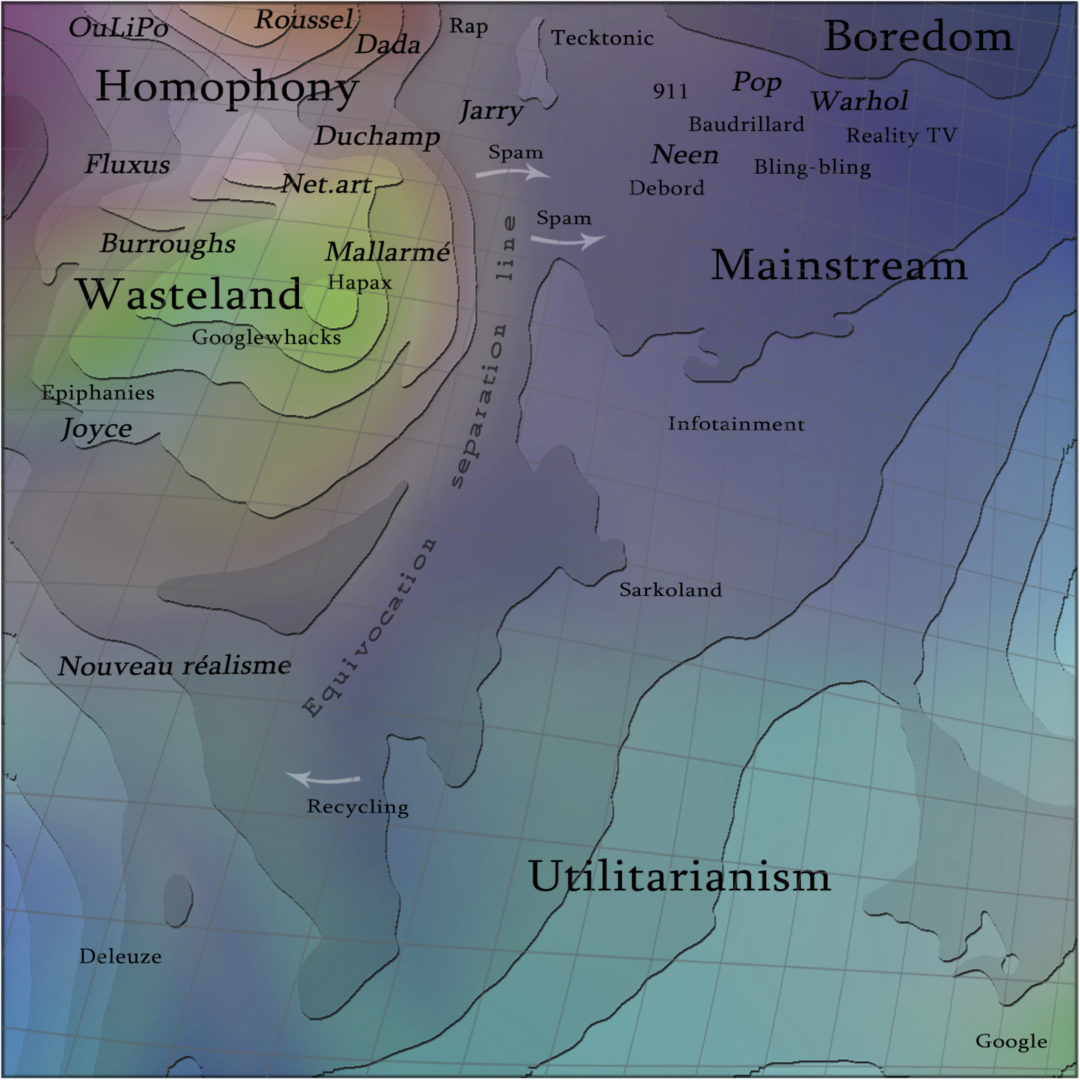
The artist draws inspiration from this cartography to reinterpret major media phenomena and movements in Art History. Several zones of “decline of the aura of language” are identified: the Mainstream zone, which refers to common discourse and speech, buzzwords and one-track thinking; the Boredom zone, where the semantic proximity of words is at its maximum and where everything is predictable, where one can find bling and kitsch, pop movements, Warhol, etc.; and the Wasteland, a brownfield characterised by very little semantic proximity, representative of Joyce’s Epiphanies, but also of Mallarmé’s Hapax, which are at the very limit what is comprehensible; and finally, the zone of Utilitarianism, in which the meaning of words is very (too) clearly defined, in order to neutralise any type of ambiguity or equivocation.
Acting as a type of “weather map of global thinking”, the Dadamap is marked and crossed by a variety of fluxes and movements that direct and determine the motions and circulation of Google’s thinking. The raw material of semantic capitalism would be extracted from the Wasteland, richer in new meanings and new terms, later on channelled into the Mainstream zone, where it would be abundantly consumed, before inevitably becoming boring, in Boredom, and slipping into the zone of Utilitarianism before being completely abandoned to the Wasteland and recycled. Therefore, if the words or groups of words that compose the Wasteland are those that are the least searched for on Google, they are also the ones that are the most capable of renewing language by encouraging greater creativity. On the contrary, the Utilitarian zone is the one that anaesthetises language, by allocating one, and only one, meaning to each word, and thus depriving them of any kind of ambiguity and polysemy. Visually speaking, each pair of words is represented on the map (Dadamap) by a pixel whose colour is defined by the variables of homophony (the colour red), of semantic proximity (green) and of equivocation (blue). As such, pixels organise changing and evolving climates according to the disturbances of language. The project allows juggling different possible variations for each one of these linguistic coefficients. It enables the Web user to experiment with the different zones of language, by navigating from one to the other. The corresponding words and their relationship reveal themselves, without any pre-existing dictionary, as an emanation or pure emergence, in real time, of the current state of language under the Google application.
What does this Google project tell us?
Our mission is to organise all the information in the world; Don’t be evil.9
Organise and do good! Google’s two missions aim at implementing as its operational mode the idea of bringing order out of chaos. But from this point of view, the multinational company seems to stand for and extend in its own way the vector of American imperialism: the idea of good against evil. Hope or democratic thought then definitely reach their breaking point.
With PageRank we are, for better or for worse, in the domain of rhetoric, of commonplaces (Wikipedia’s uncontroversial topics). For better: The ideas that are accepted, by the greatest number and by the most renowned people, constitute our common world, —we find the same weighting of democracy by aristocracy in Aristotle as we do in PageRank. For worse: When the common world produces only “clichés,” and when we are unthinkingly bogged down in what Hannah Arendt calls the “banality of evil,” not so much because evil is banal, but rather because it becomes impossible to say or live anything other than banalities.10
The way Google works is in fact entirely based on the greatest number. It is about doxa against agôn: common opinion, norms and all-to-simple standards, against the trial of careful thought and questioning, and the conflict of ideas. Google seeks the opinion of the majority, to the detriment of controversy or opposition; or to put it simply, to the detriment of the diversity and plurality of heterogeneous points of view.
It should be noted that The Dadameter no longer focuses exclusively on keywords, transformed into AdWords, but this time targets the panoptical prediction desires that are specific to the semantic Web developed by Google. This new work by Christophe Bruno prompts thoughts on the phenomena of network and globalisation, which profoundly redefine our relationship to language in the age of the semantic Web and artificial intelligence. By considering the Web a text that reshapes itself constantly, this project also aims to expose Google’s invisible algorithms.
It is quite tempting to summon here the myth of Big Brother: Google sees everything, organises everything and controls everything, by profiling, in order to optimise its algorithm-engine. In his anticipative, social science fiction novel 1984, Georges Orwell imagined a dystopian environment subjecting people to a totalitarian regime. The Big Brother panopticon, as capable of seeing everything without being seen, deployed three main control methods on its people: video/audio surveillance, memory removal (by falsifying and rewriting history) and the destruction of language (simplification by purging its vocabulary). The creation of newspeak became one of the main instruments of this strategy to perfectly master consciousness by restricting the limits of thought of its agents: “the ‘revolution’ will be complete when language is perfect.”
It’s a beautiful thing, the destruction of words. Of course the great wastage is in the verbs and adjectives, but there are hundreds of nouns that can be got rid of as well. It isn’t only the synonyms; there are also the antonyms. After all, what justification is there for a word which is simply the opposite of some other word? A word contains its opposite in itself. Take ‘good’, for instance. If you have a word like ‘good’, what need is there for a word like ‘bad’? ‘Ungood’ will do just as well —better, because it’s an exact opposite, which the other is not. Or again, if you want a stronger version of ‘good’, what sense is there in having a whole string of vague useless words like ‘excellent’ and ‘splendid’ and all the rest of them? ‘Plusgood’ covers the meaning, or ‘doubleplusgood’ if you want something stronger still. Of course we use those forms already. But in the final version of Newspeak there’ll be nothing else. In the end the whole notion of goodness and badness will be covered by only six words— in reality, only one word. Don’t you see the beauty of that, Winston? It was Big Brother’s idea originally, of course,’ he added as an afterthought.11
Reading Google’s success story through the prism of Orwell and through Christophe Bruno’s art projects can turn out to be quite disturbing. And worrisome too. On the one hand, every computer using Google is located and identified by its IP address (Internet Protocol). On the other hand, every search is tailored and personalised. Google keeps a record of each and every one of the user’s previous hits and requests, which it tracks through cookies that memorise them. Finally, many IT applications and solutions, owned by the company Alphabet (Google’s parent company since 2015) or structured with Google, index and store content that is external to the Web: Gdesktop indexes hard disks, Gmail scans and collects emails, etc.12 For example, one can recall when in 2006 Google surrendered to the Chinese regime by agreeing to reduce its access to a local Internet, a sort of politically correct Intranet. Google then obeyed to the order of a Chinese equivalent of the American Patriot Act, which guaranteed that attempts to connect to suppressed addresses would not even generate an error message.
Navigating between parody and technology foresight, Christophe Bruno pushes this attempt to control and mechanise the production of language to its very limits. The artist plays around with Google’s terms and potentialities by simultaneously highlighting the dangers of generalised and continuous surveillance of the Web; which in its 2.0 version, is embodied through the culmination of control strategies in the field of writing. For what else is there but a kind of natural selection of words and language set up and organised by Google? It’s not about making words literally disappear, but this type of scheduling and sequencing obviously produces the perverse incentive of relegating them to a status and zone of invisibility that is, to say the least, problematic… This phenomenon is ironically exemplified by Christophe Bruno’s Dadameter. For only the most profitable words are put in the limelight by Google, while those of lower value are gradually neglected and perhaps even forgotten. The impoverishment of language, as a twisted effect of Google’s semantic capitalism, is at the heart of the issues tackled by the works of the artist Christophe Bruno. But even though certain aspects of these works do border on dystopia, Christophe Bruno’s modus operandi is also, and above all, that of farce and humour that mugs and parodies the boundless ambitions and dreams of almighty power of Google The “God”. Christophe Bruno’s projects find themselves precisely at the crossroads of scientific objectivity, language performativity and satire.
- Barbara Cassin, Google me: one-click democracy, translated by Michael Syrotinski, New York: Fordham University Press [accessed online], 2018 [2007].
- Cf. Christophe Bruno, Epiphanies, www.iterature.com/epiphanies, (2001-2014).
- Google’s brand name, which also became a verb, “to google”, plays on clever word games: googol, google, go-ogle. The word that was originally chosen was “Googol” (inspired by the mathematical formula 1+100, or 10100, which aimed at symbolizing the upcoming power of the search engine), but another instance of the word – googly – can be found in James Joyce’s literature (Finnegan’s Wake, 1939), and refers to the issue of the gaze, – to ogle – a verb which rather signifies “ to look with large, round eyes; to stare, to glance with invitation; to eye amorously,” Barbara Cassin [2007].
- Christophe Bruno, extract from a public lecture given at the École nationale des arts décoratifs of Paris (Ensad) in 2007.
- Cf. Christophe Bruno, Google Adwords Happening, www.iterature.com/adwords (2002) – First Prize at the Ars Electronica Festival of 2003, in Linz, Austria.
- Cf. Barbara Cassin, Google me: one-click democracy, translated by Michael Syrotinski, New York: Fordham University Press [accessed online], 2018 [2007], p. 50.
- Cf. Ippolita, La Face cachée de Google, Paris, Manuels Payot, 2008. “Ippolita” is the pseudonym of an Italian group of hackers and libertarian aficionados that have been committed to exposing the highly intrusive system of Google. See the group’s website: http://ippolita.net.
- Cf. Christophe Bruno, Human Browser, www.iterature.com/human-browser, (2004-2017).
- Cf. Christophe Bruno, The Dadameter, www.iterature.com/dadameter, (2004-2017).
- See the homepage and information page of Google Incorporated.
- Barbara Cassin, Google me: one-click democracy, translated by Michael Syrotinski, New York: Fordham University Press [accessed online], 2018 [2007], p. 53.
- Georges Orwell, 1984, Part One, Chapter 5, [1949], London: Penguin Modern Classics, 2013.
- According to Barbara Cassin, “Google ogles over your shoulder whenever you write an email […] Google, through a vicarious robot, sees everything, and looks at you with goo-goo eyes, only offering you what interests you —this is its style of flirting, with every one of you, while giving you the impression of being unique.” Barbara Cassin, Google me: one-click democracy, translated by Michael Syrotinski, New York: Fordham University Press [accessed online], 2018 [2007], p. 28.
Image on top : Christophe Bruno, Human Browser, 2004-2017
Related articles
Yoshitoro Nara at Guggenheim, Bilbao
by Guillaume Lasserre
Moffat Takadiwa
by Andréanne Béguin
Alias at M Museum, Leuven
by Vanessa Morisset

